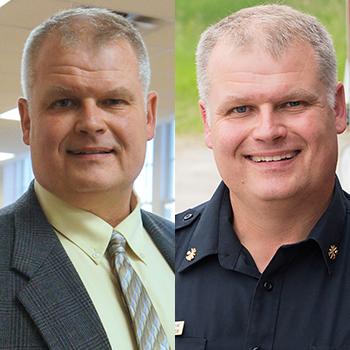Discoveries for life
The faces of health research 2024
| Title |
|---|
The Terminal Diner: A place everyone visits onceLeveraging participatory design and the arts to disseminate health services research to the general public, collect insights, and inform future research 
Because death and end of life are often difficult and negative topics of conversation for many Canadians, many people opt to avoid the topic altogether, often until they are immediately faced with it. Research has shown that while people may have many contacts with the health care system as they become sicker, they may not receive palliative care or other adequate supports. Among the care they do receive, they often see an inconsistent mix of providers, which can negatively impact their quality of life. Dr. Sarina Isenberg, a researcher at the Bruyère Research Institute and University of Ottawa, recognizes that research findings and questions do not always feel accessible to the public, and some people may not think the research is "relevant" to them, but the reality is everybody will die. That's why Dr. Isenberg and her team created The Terminal Diner, an interactive installation that combines research and design to explore the topic of end-of-life experiences. The goal of this unique exhibit is to invite people to explore this topic in an approachable way and to build public awareness around a universal experience. Having been previously exhibited at Evergreen Brick Works in Toronto, the exhibit is currently being displayed at the David Braley Health Sciences Centre in Hamilton until April 1, 2024. Future venues include the Ottawa School of Art, Bruyère's Saint Vincent Hospital in Ottawa, and the McGill International Congress on Palliative Care in Montreal. This CIHR-funded work is done in collaboration with Dr. Michelle Howard of McMaster's Department of Family Medicine, designers Karen Oikonen and Kate Wilkes, research staff Aria Wills and Shuaib Hafid, and caregiver partner Nyanna Flynn. Further reading |
Cancer, Firefighting and Science: Unique PartnershipsHow cross-discipline expertise can help advance our understanding and treatment of cancer 
As a translational cancer researcher, Dr. Jim Petrik at the University of Guelph is investigating how manipulating the tumour microenvironment can enhance the uptake and efficacy of treatments such as chemotherapy, virotherapy, and immunotherapy. Tumours often have an abnormal structure of blood vessels that disrupts blood flow and leads to a low oxygen state known as hypoxia. This state can reduce the effectiveness of cancer treatments and lead to poorer outcomes for patients. Dr. Petrik's lab has developed an approach that normalizes the tumour vasculature to enhance vascular perfusion and reduce tumour hypoxia. They have shown that this remodeling of the microenvironment increases the uptake of cancer therapies by approximately 500% and induces regression of advanced stage ovarian and pancreatic cancers in preclinical models. Dr. Petrik and his team are very excited to be working towards clinical trials with this novel therapeutic approach. Dr. Petrik combines his career in cancer research with a leadership position in the firefighting services as the Fire Chief for the Guelph Eramosa Fire Department. This role gives Dr. Petrik the opportunity to bring his cancer research expertise to addressing the alarming increase in the incidence of many different cancers among firefighters. As Fire Chief, he is collaborating on a CIHR-funded study on barriers to the use of personal protective gear by firefighters. As a member of the Canadian Association of Fire Chiefs Cancer Committee, Dr. Petrik and his fire service colleagues are taking a science-based approach to keeping firefighters safe. Together they are working to understand the exposure vulnerabilities that firefighters face and responding to the need for a robust medical monitoring program for firefighters. In June 2023, Canada's Parliament passed Bill C-224, which calls on the Minister of Health to develop a national framework to raise awareness of cancers linked to firefighting with the goal of improving access for firefighters to cancer prevention and treatment. It also designated January as Firefighter Cancer Awareness Month in Canada. Further reading |
Flames and risks: firefighters at risk of cancer and other diseasesResearchers seek to enhance protection for firefighters by assessing the risk of disease and exposure to hazards 
Firefighters are at increased risk of cancer and are exposed to a mix of carcinogenic (cancer causing) hazards, including fire smoke, flame retardants, diesel engine exhaust, asbestos, and shift work. The International Agency for Research on Cancer (IARC) recently re-classified firefighting as carcinogenic to humans on the basis of sufficient evidence for cancer in humans, with the strongest evidence for bladder cancer and mesothelioma, and probable associations with prostate, colon, and testicular cancers, as well as skin melanomas and non-Hodgkin's lymphomas. Drs. Paul Demers, Tracy Kirkham, and Jeavana Sritharan at Ontario Health's Occupational Cancer Research Centre and the University of Toronto's Dalla Lana School of Public Health are seeking to enhance protection for firefighters by assessing the risk of disease and exposure to hazards. They developed a surveillance system that has been used for large epidemiologic studies that have identified higher risks of certain cancers among firefighters consistent with the IARC evaluation. By gaining a better understanding of the risk of cancer and related exposures, they are helping determine appropriate preventative measures for firefighters and ultimately reduce disease risk. These researchers have an ongoing project to examine respiratory fit testing for firefighters during simulated life support tasks, which may contribute to enhancing respiratory protection requirements, respiratory fit testing protocols, and other health and safety measures. They are also developing methods to measure exposure to polyfluorinated substances (PFAS) and other flame retardants in firefighters and completed a study examining the effectiveness of measures to control diesel engine exhaust in firehalls. In June 2023, Canada's Parliament passed Bill C-224, which calls on the Minister of Health to develop a national framework to raise awareness of cancers linked to firefighting with the goal of improving access for firefighters to cancer prevention and treatment. It also designated January as Firefighter Cancer Awareness Month in Canada. Further reading
|
- Date modified:
